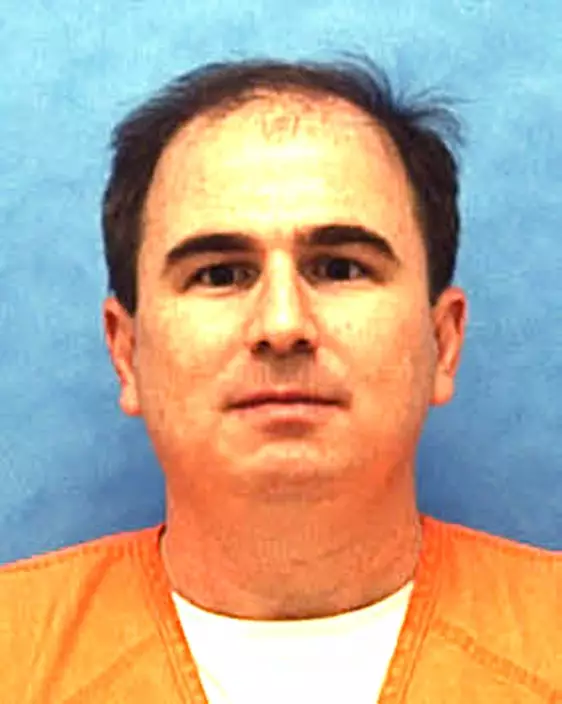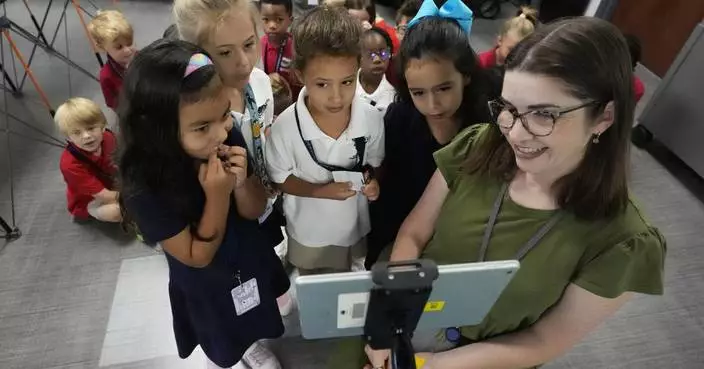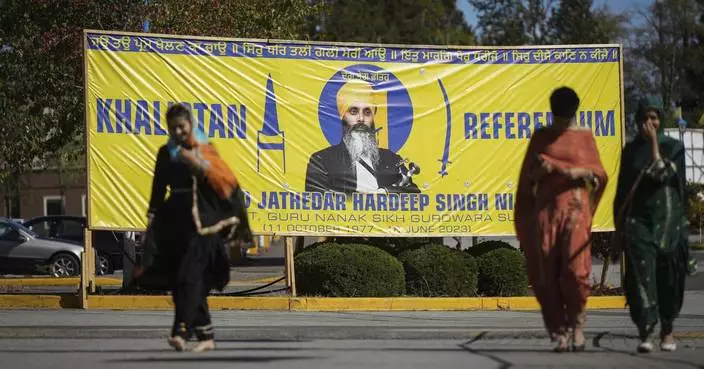A Florida inmate convicted of raping and killing a college student decades ago screamed and yelled "murderers!" three times, thrashing on a gurney as he was being put to death Thursday.

This undated photo made available by the Florida Department of Law Enforcement shows Eric Scott Branch in custody. (Florida Department of Law Enforcement via AP)
The governor's office said Eric Scott Branch, 47, was pronounced dead at 7:05 p.m. Thursday after receiving a lethal injection at Florida State Prison. Branch was convicted of the 1993 rape and fatal beating of University of West Florida student Susan Morris, 21, whose naked body was found buried in a shallow grave near a nature trail.
Just as officials were administering the lethal drugs that included a powerful sedative, Branch let out a loud, blood-curdling scream, thrashed about on his gurney and then yelled "murderers! murderers! murderers" before falling silent with a guttural groan.
Moments earlier, he had addressed the corrections officers in the room with him by saying that, instead of them carrying out the death sentence, it should have been Gov. Rick Scott and Attorney General Pam Bondi, both Republicans.

Herman Lindsey talks to people during a vigil for Eric Scott Branch in Gainesville, Fla., Thursday, Feb. 22, 2018, as he is sentenced to the death penalty. (Lauren Bacho/The Gainesville Sun via AP)
"Let them come down here and do it. I've learned that you're good people and this is not what you should be doing," Branch told the officers.
Asked whether Branch's scream could have been caused by the execution drugs, Department of Corrections spokeswoman Michelle Glady said afterward that "there was no indication" that the scream was caused by the lethal injection procedure. She said that conclusion had been confirmed by the Florida Department of Law Enforcement.

Joseph Thornton, a Gainesville, Fla., resident, rings a bell during a vigil for Eric Scott Branch in Gainesville, Thursday, Feb. 22, 2018, as he is sentenced to the death penalty. (Lauren Bacho/The Gainesville Sun via AP)
After Thursday's execution, the Morris family issued a statement saying they are still mourning the victim's death a quarter-century ago.
"Twenty-five years ago, Susan's life was suddenly and brutally extinguished. We have grieved for her longer that she was with us. Yet because of who she was ... she will never be forgotten by those who love her," said the statement read out by the victim's sister, Wendy Morris Hill.
Outside the prison, Herman Lindsey joined anti-death penalty protesters. Lindsey, a former death row inmate who was exonerated in 2009, said he wants to see the practice abolished.
"There's no way to guarantee we're not killing innocent people," he said.
Evidence in the case shows that Branch approached Morris after she left a night class on Jan. 11, 1993, so he could steal her red Toyota and return to his home state of Indiana. He was arrested while traveling there.
In denying one of Branch's appeals, the Florida Supreme Court noted that the crime was particularly brutal.
"She had been beaten, stomped, sexually assaulted and strangled. She bore numerous bruises and lacerations, both eyes were swollen shut," the justices wrote.
Branch also was convicted of sexually assaulting a 14-year-old girl in Indiana and of another sexual assault in Panama City, Florida, that took place just 10 days before the fatal attack on Morris, court records show.
The jury in his murder case recommended the death penalty by a 10-2 vote under Florida's old capital punishment system, which was ruled unconstitutional by the U.S. Supreme Court in 2016. The high court said juries must reach a unanimous recommendation for death and judges cannot overrule that. Florida legislators subsequently changed the system to comply.
One of Branch's final appeals to the U.S. Supreme Court involved whether he deserved a new sentencing hearing because of that jury's 10-2 vote in his 1994 trial. The Florida Supreme Court has ruled that the new system of sentencing does not apply to inmates sentenced to death before 2002.
Branch claimed in a last-minute appeal that the Florida court's decisions on which inmates get new sentencing hearings and which do not are unfair and arbitrary. In court documents, Branch's lawyers say this prohibits about 150 Florida death-row inmates from having their sentences reviewed.
The U.S. Supreme Court, without comment, rejected that appeal Thursday and one other Branch's attorneys had filed.
The Florida Supreme Court had denied a stay of execution in the Branch case on Feb. 6, leaving him with only limited appeals in federal courts.
Corrections Department spokeswoman Michelle Glady said Branch had been visited by his daughter Thursday morning and refused a meeting with a spiritual adviser. For the last meal, he had a pork chop, T-bone steak, French fries and ice cream.
Elsewhere, Texas Gov. Greg Abbott spared the life Thursday of a convicted killer shortly before the man's scheduled execution for masterminding the fatal shootings of his mother and brother.
In sparing the life of Thomas "Bart" Whitaker about an hour before he was scheduled for lethal injection, Abbott accepted the state parole board's rare clemency recommendation. Whitaker's father, Kent, also was shot in the 2003 plot at the family's suburban Houston home but survived and led the effort to save his son from execution. Abbott commuted the sentence to life without parole.
In Alabama, Doyle Lee Hamm was sentenced to die Thursday evening for the 1987 death of a motel clerk during a robbery. But Hamm fought his death sentence, arguing there was a risk of a botched execution because of damage to his veins due to lymphoma and other illnesses. The U.S. Supreme Court on Thursday evening temporarily delayed the lethal injection procedure as it considered his request for a permanent stay.
WASHINGTON (AP) — President Joe Biden’s campaign and Democratic candidates are in a fevered race with Republicans over who can best exploit the potential of artificial intelligence, a technology that could transform American elections — and perhaps threaten democracy itself.
Still smarting from being outmaneuvered on social media by Donald Trump and his allies in 2016, Democratic strategists said they are nevertheless treading carefully in embracing tools that trouble experts in disinformation. So far, Democrats said they are primarily using AI to help them find and motivate voters and better identify and overcome deceptive content.
″Candidates and strategists are still trying to figure out how to use AI in their work. People know it can save them time — the most valuable resource a campaign has,” said Betsy Hoover, director of digital organizing for President Barack Obama’s 2012 campaign and co-founder of the progressive venture capital firm Higher Ground Labs. “But they see the risk of misinformation and have been intentional about where and how they use it in their work.”
Campaigns in both parties for years have used AI — powerful computer systems, software or processes that emulate aspects of human work and cognition — to collect and analyze data.
The recent developments in supercharged generative AI, however, have provided candidates and consultants with the ability to generate text and images, clone human voices and create video at unprecedented volume and speed.
That has led disinformation experts to issue increasingly dire warnings about the risks posed by AI’s ability to spread falsehoods that could suppress or mislead voters, or incite violence, whether in the form of robocalls, social media posts or fake images and video.
Those concerns gained urgency after high-profile incidents that included the spread of AI-generated images of former President Donald Trump getting arrested in New York and an AI-created robocall that mimicked Biden’s voice telling New Hampshire voters not to cast a ballot.
The Biden administration has sought to shape AI regulation through executive action, but Democrats overwhelmingly agree Congress needs to pass legislation to install safeguards around the technology.
Top tech companies have taken some steps to quell unease in Washington by announcing a commitment to regulate themselves. Major AI players, for example, entered into a pact to combat the use of AI-generated deepfakes around the world. But some experts said the voluntary effort is largely symbolic and congressional action is needed to prevent AI abuses.
Meanwhile, campaigns and their consultants have generally avoided talking about how they intend to use AI to avoid scrutiny and giving away trade secrets.
The Democratic Party has “gotten much better at just shutting up and doing the work and talking about it later,” said Jim Messina, a veteran Democratic strategist who managed Obama’s winning reelection campaign.
The Trump campaign said in a statement that it “uses a set of proprietary algorithmic tools, like many other campaigns across the country, to help deliver emails more efficiently and prevent sign up lists from being populated by false information.” Spokesman Steven Cheung also said the campaign did not “engage or utilize” any tools supplied by an AI company, and declined to comment further.
The Republican National Committee, which declined to comment, has experimented with generative AI. In the hours after Biden announced his reelection bid last year, the RNC released an ad using artificial intelligence-generated images to depict GOP dystopian fears of a second Biden term: China invading Taiwan, boarded up storefronts, troops lining U.S. city streets and migrants crossing the U.S. border.
A key Republican champion of AI is Brad Parscale, the digital consultant who in 2016 teamed up with scandal-plagued Cambridge Analytica, a British data-mining firm, to hyper target social media users. Most strategists agree that the Trump campaign and other Republicans made better use of social media than Democrats during that cycle.
Scarred by the memories of 2016, the Biden campaign, Democratic candidates and progressives are wrestling with the power of artificial intelligence and nervous about not keeping up with the GOP in embracing the technology, according to interviews with consultants and strategists.
They want to use it in ways that maximize its capabilities without crossing ethical lines. But some said they fear using it could lead to charges of hypocrisy — they have long excoriated Trump and his allies for engaging in disinformation while the White House has prioritized reining in abuses associated with AI.
The Biden campaign said it is using AI to model and build audiences, draft and analyze email copy and generate content for volunteers to share in the field. The campaign is also testing AI’s ability to help volunteers categorize and analyze a host of data, including notes taken by volunteers after conversations with voters, whether while door-knocking or by phone or text message.
It has experimented with using AI to generate fundraising emails, which sometimes have turned out to be more effective than human-generated ones, according to a campaign official who spoke on the condition of anonymity because he was not authorized to publicly discuss AI.
Biden campaign officials said they plan to explore using generative AI this cycle but will adhere to strict rules in deploying it. Among the tactics that are off limits: AI cannot be used to mislead voters, spread disinformation and so-called deepfakes, or deliberately manipulate images. The campaign also forbids the use of AI-generated content in advertising, social media and other such copy without a staff member’s review.
The campaign’s legal team has created a task force of lawyers and outside experts to respond to misinformation and disinformation, with a focus on AI-generated images and videos. The group is not unlike an internal team formed in the 2020 campaign — known as the “Malarkey Factory,” playing off Biden’s oft-used phrase, “What a bunch of malarkey.”
That group was tasked with monitoring what misinformation was gaining traction online. Rob Flaherty, Biden’s deputy campaign manager, said those efforts would continue and suggested some AI tools could be used to combat deepfakes and other such content before they go viral.
“The tools that we’re going to use to mitigate the myths and the disinformation is the same, it’s just going to have to be at a higher pace,” Flaherty said. “It just means we need to be more vigilant, pay more attention, be monitoring things in different places and try some new tools out, but the fundamentals remain the same.”
The Democratic National Committee said it was an early adopter of Google AI and uses some of its features, including ones that analyze voter registration records to identify patterns of voter removals or additions. It has also experimented with AI to generate fundraising email text and to help interpret voter data it has collected for decades, according to the committee.
Arthur Thompson, the DNC’s chief technology officer, said the organization believes generative AI is an “incredibly important and impactful technology” to help elect Democrats up and down the ballot.
“At the same time, it’s essential that AI is deployed responsibly and to enhance the work of our trained staff, not replace them. We can and must do both, which is why we will continue to keep safeguards in place as we remain at the cutting edge,” he said.
Progressive groups and some Democratic candidates have been more aggressively experimenting with AI.
Higher Ground Labs — the venture capital firm co-founded by Hoover — established an innovation hub known as Progressive AI Lab with Zinc Collective and the Cooperative Impact Lab, two political tech coalitions focused on boosting Democratic candidates.
The goal was to create an ecosystem where progressive groups could streamline innovation, organize AI research and swap information about large language models, Hoover said.
Higher Ground Labs, which also works closely with the Biden campaign and DNC, has since funded 14 innovation grants, hosted forums that allow organizations and vendors to showcase their tools and held dozens of AI trainings.
More than 300 people attended an AI-focused conference the group held in January, Hoover said.
Jessica Alter, the co-founder and chair of Tech for Campaigns, a political nonprofit that uses data and digital marketing to fight extremism and help down-ballot Democrats, ran an AI-aided experiment across 14 campaigns in Virginia last year.
Emails written by AI, Alter said, brought in between three and four times more fundraising dollars per work hour compared with emails written by staff.
Alter said she is concerned that the party might be falling behind in AI because it is being too cautious.
“I understand the downsides of AI and we should address them,” Alter said. “But the biggest concern I have right now is that fear is dominating the conversation in the political arena and that is not leading to balanced conversations or helpful outcomes.”
Rep. Adam Schiff, the Democratic front-runner in California’s Senate race, is one of few candidates who have been open about using AI. His campaign manager, Brad Elkins, said the campaign has been using AI to improve its efficiency. It has teamed up with Quiller, a company that received funding from Higher Ground Labs and developed a tool that drafts, analyzes and automates fundraising emails.
The Schiff campaign has also experimented with other generative AI tools. During a fundraising drive last May, Schiff shared online an AI-generated image of himself as a Jedi. The caption read, “The Force is all around us. It’s you. It’s us. It’s this grassroots team. #MayThe4thBeWithYou.”
The campaign faced blowback online but was transparent about the lighthearted deepfake, which Elkins said is an important guardrail to integrating the technology as it becomes more widely available and less costly.
“I am still searching for a way to ethically use AI-generated audio and video of a candidate that is sincere,” Elkins said, adding that it’s difficult to envision progress until there’s a willingness to regulate and legislate consequences for deceptive artificial intelligence.
The incident highlighted a challenge that all campaigns seem to be facing: even talking about AI can be treacherous.
“It’s really hard to tell the story of how generative AI is a net positive when so many bad actors — whether that’s robocalls, fake images or false video clips — are using the bad set of AI against us,” said a Democratic strategist close to the Biden campaign who was granted anonymity because he was not authorized to speak publicly. “How do you talk about the benefits of an AK-47?”
Associated Press writers Alan Suderman and Garance Burke contributed to this report.
This story is part of an Associated Press series, “The AI Campaign,” which explores the influence of artificial intelligence in the 2024 election cycle.
The Associated Press receives financial assistance from the Omidyar Network to support coverage of artificial intelligence and its impact on society. AP is solely responsible for all content. Find AP’s standards for working with philanthropies, a list of supporters and funded coverage areas at AP.org.
Contact the AP’s global investigative team at Investigative@ap.org or https://www.ap.org/tips/.

FILE - President Joe Biden exits the stage following a political rally at the Philadelphia Convention Center in Philadelphia, Saturday, June 17, 2023. A Democratic strategist close to the Biden campaign who was not authorized to speak publicly, said the campaign continues to use AI to model and build audiences, draft and analyze email copy and generate content for volunteers to share in the field, but officials insisted their experimentation begins with a set of ethical standards that outlines what they won’t do, including misleading voters, spreading disinformation and so-called deepfakes, deliberately manipulated images, or using AI-generated content without a staff member’s review. (AP Photo/Joe Lamberti, File)

FILE - President Joe Biden is seen through a TV camera viewfinder as he speaks during a political rally at the Philadelphia Convention Center in Philadelphia, Saturday, June 17, 2023. “It’s really hard to tell the story of how generative AI is a net positive when so many bad actors – whether that’s robocalls, fake images or false video clips – are using the bad set of AI against us,” said a Democratic strategist close to the Biden campaign who would only discuss what was described as a sensitive topic if granted anonymity. (AP Photo/Joe Lamberti, File)

FILE - President Joe Biden takes a selfie at Marine Corps Air Station Cherry Point in Havelock, N.C., Monday, Nov. 21, 2022, at a Thanksgiving dinner with members of the military and their families. Democrats are wrestling with how to deploy generative AI. Still smarting from being outmaneuvered on social media by Donald Trump and his allies in 2016, Democratic strategists say they are nevertheless treading carefully in embracing artificial intelligence tool that disinformation experts say could pose a threat to democracy. (AP Photo/Patrick Semansky, File)

FILE - President Joe Biden delivers a speech marking the one-year anniversary of the Russian invasion of Ukraine, at the Royal Castle Gardens, Tuesday, Feb. 21, 2023, in Warsaw. For years, campaigns in both parties have used machine learning and sophisticated artificial intelligence tools to collect, analyze and automate data. But disinformation experts have amplified warnings in recent months about the threats posed by the advent of powerful generative AI programs, which allow the rapid proliferation of fake images, video or audio. (AP Photo/ Evan Vucci, File)

FILE - President Joe Biden speaks during a Hanukkah reception in the East Room of the White House in Washington, Monday, Dec. 11, 2023. The White House announced new rules in March 2024 for how the federal government should use artificial intelligence, building off an executive order to a create a set of standards in AI development. (Doug Mills/The New York Times via AP, Pool, File)

















